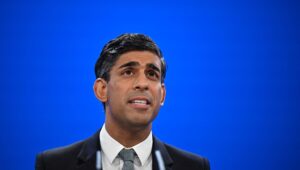Is Rishi Sunak doomed to lose the next election? Yesterday’s King’s Speech, the first of the new reign but almost certainly the last before voters go to the polls, was the Prime Minister’s big opportunity to set out a winning agenda. Yet so far, the announcements have done little to persuade commentators that the Conservatives are on course for victory. Even when policies address Britain’s long-term challenges, they are dismissed as immaterial to Tory chances of re-election. But Sunak is far from the first Conservative leader to face tough electoral odds and from the long roster of previous leaders, he can definitely find some consolation. Of them all, it is the now largely forgotten Alec Douglas-Home who might provide some valuable political guidance.
The 14th Earl of Home emerged as leader in autumn 1963 after one of the most contentious leadership selections in Conservative history. The process even forced him to rebrand, becoming Sir Alec Douglas-Home when compelled by democratic mores to disclaim his hereditary title. His party was divided, behind in the polls, and widely expected to lose the next election. The circumstances were unpropitious, and on first inspection Douglas-Home doesn’t offer an encouraging role model for Sunak. When voters had their say on his leadership in the 1964 election, he was ejected from office in favour of Harold Wilson. But in his short time at the helm, Douglas-Home managed to turn a widely forecast electoral blowout for the Conservatives into one of the closest contests of the century. When all the votes were counted, Labour led the Conservatives by just 0.7%, earning them an overall majority of just four seats.
Douglas-Home’s turnaround mission began by restoring stability and decency to a government rocked by scandal. Throughout the spring and summer of 1963, rumours swirled around Westminster about War Secretary John Profumo’s affair with the showgirl Christine Keeler, who’d also had a fling with a Soviet Naval attaché. Both decency and national defence were said to be under threat by the actions of a government minister. Profumo strenuously denied the allegations in Parliament — a straightforward lie — and was ultimately forced to resign, but only after his lapse in judgement exposed a government that appeared to have lost its moral compass. Douglas-Home was one of the few senior ministers who managed to stay aloof from the sordid affair, preserving his reputation and enabling his appointment as prime minister to signal a clear turning of the page.
Sunak’s premiership began in much the same spirit. On the steps of Downing Street one year ago, he told the country that his “government will have integrity, professionalism and accountability at every level”. It was a promise that things would change after two Tory premierships were prematurely felled — one by scandal, the second by a mini-budget that called the government’s economic credibility into question. Sunak, the former chancellor known for his hard work and teetotalism, was well placed to signal change at the top. But as is now clear, change alone isn’t enough for the public to look at the Conservatives with fresh eyes.
Like Douglas-Home before him, Sunak also needs to find ways to get the better of a revitalised Labour party. The Tories’ opponent six decades ago was the wily and accusatory Harold Wilson. From the moment Douglas-Home walked through the door of No. 10 Wilson pounced on his aristocratic status, alleging that he had won the leadership thanks to his “family and hereditary connections” in an affront to the meritocratic spirit of the age. Against Wilson’s class politics, Douglas-Home fired back that while he may have been the 14th Earl of Home, “Mr Wilson, when you come to think of it, is the 14th Mr Wilson”. His pithy line, combined with his decent and earnest approach to politics, helped make Labour’s attacks look both unfair and ineffective.
Keir Starmer has been borrowing from the Wilson playbook in his attacks on Sunak. Whilst insisting that he is “very relaxed about people being rich and getting rich”, a tactic borrowed from another Labour leader, Starmer has consistently chided Sunak for his personal wealth. Yet Sunak is no landed aristocrat. His story — the migrants’ son who went on to lead his country — is self-evidently one of ambition realised in a meritocratic country. But Labour clearly sees the Sunak family’s success, and that of the family he married into, as one of his principal weaknesses. Douglas-Home repudiated Wilson by tapping into the country’s sense that what someone does, not what they’re born with, should determine how you judge them. Sunak would do well to turn his own story back on Labour, emphasising how his life shows a Britain where hard work and determination pays off — a message Labour will not want to oppose.
While Douglas-Home’s approach earned him the right to be heard among an electorate that had grown weary of his party, it wasn’t enough to win the election. Two key failings denied him another term. Firstly, Douglas-Home failed to heal his party after his bumpy ascent to the top of British politics. When Prime Minister Harold Macmillan announced his resignation in October 1963, there were no clear rules for the selection of the new prime minister. The decision would ultimately lie with the Queen, who would take her advice from Macmillan. Over the course of 10 days, senior Conservatives jostled in unprecedented and chaotic scenes to earn themselves the Queen’s commission. Douglas-Home stayed above the fray, refusing to comment on the leadership and even briefly ruling himself out of contention before he emerged as the choice of Macmillan and senior Tories.
The appointment of a peer crushed the ambitions and bruised the egos of many Conservatives, especially those in the Commons. Two senior MPs, Iain Macleod and Enoch Powell, were so outraged that they refused to serve in Douglas-Home’s government. Macleod went on to write a denunciation for The Spectator of the “magic circle” that had put Douglas-Home in office, while Powell vented his fury through anonymous articles in The Times, attacking the government’s policies and direction. Douglas-Home later said that their election year antics cost the Tories at the polls.
While Sunak’s elevation to the premiership followed a process with clear and predetermined rules, that hasn’t prevented a small number of MPs and activists from echoing allegations of illegitimacy from 60 years ago. Perhaps this was inevitable after the rapid turnaround of Conservative leaders left supporters of Johnson and Truss disgruntled and unexpectedly on the backbenches. Sunak has built a big-tent cabinet, including senior names from both former administrations. But the warning from Douglas-Home’s experience is that it only takes a small number of malcontents for a party to look divided. With the benchmark so low, it will take an almighty display of political skill from Sunak to keep his party’s divisions contained as polling day approaches.
Douglas-Home’s second big mistake concerned policy, specifically the abolition of the Resale Price Maintenance (RPM). Under the antiquated RPM, shops had to sell branded products at the price recommended by the manufacturer. With its removal, they could compete on price. So far, so good — for the consumer. The problem for Douglas-Home was that those in the firing line were an essential part of the Tory voting coalition: small business owners and shopkeepers. Fearing they would be undercut by major stores and driven out of business, they revolted. It was, according to Ian Gilmour, “Sir Alec’s Poll Tax”.
One motivation for the policy was the pursuit of a legacy, a means of rebutting Labour’s claim that the Conservatives had overseen “13 wasted years”. Six decades on Starmer has been making the same criticism. The challenge for Sunak, who is clearly keen to use the time between now and the next election fruitfully, is to show that his party is still brimming with ideas while recognising what can be achieved in the fifth year of a parliament — and what cannot. By abolishing RPM, Douglas-Home discovered the worst kind of electoral dividing line: one that separated him from his voters. Sunak will be hoping that yesterday’s announcements can bring the two closer together and improve his party’s polling.
One silver lining for Sunak is that, compared to Douglas-Home, he has the benefit of time. Douglas-Home’s premiership ended after just 363 days; Sunak has around another year (longer if he really wants it) before going to the polls. No two elections are the same and the playbook that would have won for Douglas-Home in 1964 won’t be the same for Sunak. But if the Prime Minister can learn the lessons of 60 years ago, he could still deliver a competitive electoral performance, as Douglas-Home did, and possibly even a Conservative victory. If not, Sunak may find that it isn’t just the beginning of his premiership that looks like Douglas-Home’s, but its ending too.
Disclaimer
Some of the posts we share are controversial and we do not necessarily agree with them in the whole extend. Sometimes we agree with the content or part of it but we do not agree with the narration or language. Nevertheless we find them somehow interesting, valuable and/or informative or we share them, because we strongly believe in freedom of speech, free press and journalism. We strongly encourage you to have a critical approach to all the content, do your own research and analysis to build your own opinion.
We would be glad to have your feedback.
Source: UnHerd Read the original article here: https://unherd.com/




